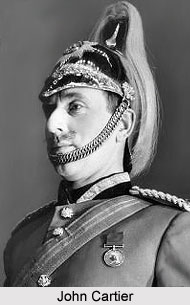 John Cartier was one of the most well known Governors of Bengal Presidency from the year 1769 to 1772. He served as a British colonial governor in the former undivided India under the rule of the British East India Company. Cartier, born in the year 1733, came to British India in the service of the British East India Company as a writer. He served as an assistant in Dacca (Dhaka, now in Bangladesh) but was banished from there in the year 1756. Later he joined Major General Robert Clive, 1st Baron Clive, KB MP FRS of India and assisted in the recapturing of Bengal. For his support, Cartier was praised by the Court of Directors of the British East India Company. After the culmination of the Battle of Plassey, the career of John Cartier accelerated. He was appointed as the Chief of the Dacca factory in 1761 and by the year 1767, he became Second in the Calcutta Council.
John Cartier was one of the most well known Governors of Bengal Presidency from the year 1769 to 1772. He served as a British colonial governor in the former undivided India under the rule of the British East India Company. Cartier, born in the year 1733, came to British India in the service of the British East India Company as a writer. He served as an assistant in Dacca (Dhaka, now in Bangladesh) but was banished from there in the year 1756. Later he joined Major General Robert Clive, 1st Baron Clive, KB MP FRS of India and assisted in the recapturing of Bengal. For his support, Cartier was praised by the Court of Directors of the British East India Company. After the culmination of the Battle of Plassey, the career of John Cartier accelerated. He was appointed as the Chief of the Dacca factory in 1761 and by the year 1767, he became Second in the Calcutta Council.
John Cartier was appointed as the Governor of Bengal Province on December 26, 1769 and was preceded by Harry Verelst, who served as Governor of Bengal from 1767 to 1769. The Bengal Presidency originally comprised east and west Bengal and was a colonial region of the British Empire in India. The region included the territories of undivided Bengal like West Bengal, Tripura, Orissa, Meghalaya, Bihar, Assam and modern Bangladesh. Cartier acted as the governor during the 1770 Bengal famine, which was a catastrophic famine between 1769 and 1773. The famine affected the lower Gangetic plain of British India and around one-third of the population died. The Court of Directors shipped a 3 person commission to Bengal to assess the situation as a response to the crisis. But the ship foundered at sea and the Court of Directors recalled Cartier as they were unable send a replacement. John Cartier served in office till 1772 was succeeded by Warren Hastings, who took office on 13 April 1772 and acted as his replacement.
Later John Cartier served as a High Sheriff of Kent in the year 1789. He died on January 25, 1802 in Bedgbury, Kent. Cartier was praised for his government of Bengal by Edmund Burke.



















